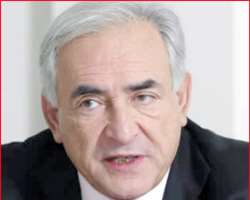Global Economy Recovers

THE world economy is recovering at a healthy pace but still needs government stimulus efforts to keep it going, the International Monetary Fund (IMF) has said.
The IMF raised its forecast for world economic growth in 2010 to nearly four percent, up from an estimate of 3.1 percent last October. It expects the United States (U.S.) economy to grow by 2.7 percent this year, significantly higher than its previous forecast of 1.5 percent.
“But with high unemployment rate in many countries and tight credit, the recovery in the United States and other advanced economies is still expected to be weak by historical standards,” the IMF said in a quarterly update of its World Economic Outlook.
The IMF's forecast for the United States is similar to many estimates by private economists. The nation's Gross Domestic Product, the broadest measure of economic output, grew at a 2.2 percent rate in last year's third quarter, after contracting for four straight quarters in the recession.
Most economists believe that growth picked up in the October-December quarter to a 4.5 percent to five per cent pace.
Much of that growth, however, was as resulted of governments' efforts to support the housing sector and broader economy, as well as rebuilding of inventories by manufacturers.
As that activity fades, growth is expected to slow in the first half of this year. The U.S. government's first estimate of fourth quarter GDP would be released Friday.
The IMF also projected that the 15 nations that use the Euro would grow by one percent in 2010, up from its 0.3 percent estimate in October. It kept its estimate for Japan the same at 1.7 percent growth.
It forecasted China's growth this year at 10 percent, and said “key emerging economies in Asia are leading the global recovery.”
A "key risk" to the recovery is that a premature and incoherent exit from the low interest rates set by many central banks and other stimulus programs may undermine global growth,” the IMF said.
The recovery is off to a stronger start than anticipated but there are still few indications that business and consumer demand is sufficient to replace government supports,” the IMF said.
In addition, bank lending is likely to remain sluggish as banks seek to rebuild capital and are experiencing additional losses in commercial real estate,” the fund said.
Other risks to the recovery include large government budget deficits that the IMF said could unsettle financial markets and lead to higher interest rates for consumers and companies.
“Still, governments should continue with stimulus programs already in place for 2010,” the IMF noted.
IMF called on central banks to keep short-term interest rates low for the rest of the year by providing another crucial support to economic growth, as inflation is likely to remain low for the foreseeable future.
The IMF, which provides loans and other assistance to troubled countries, has 186 nations.
It also performs economic analysis and monitoring.
